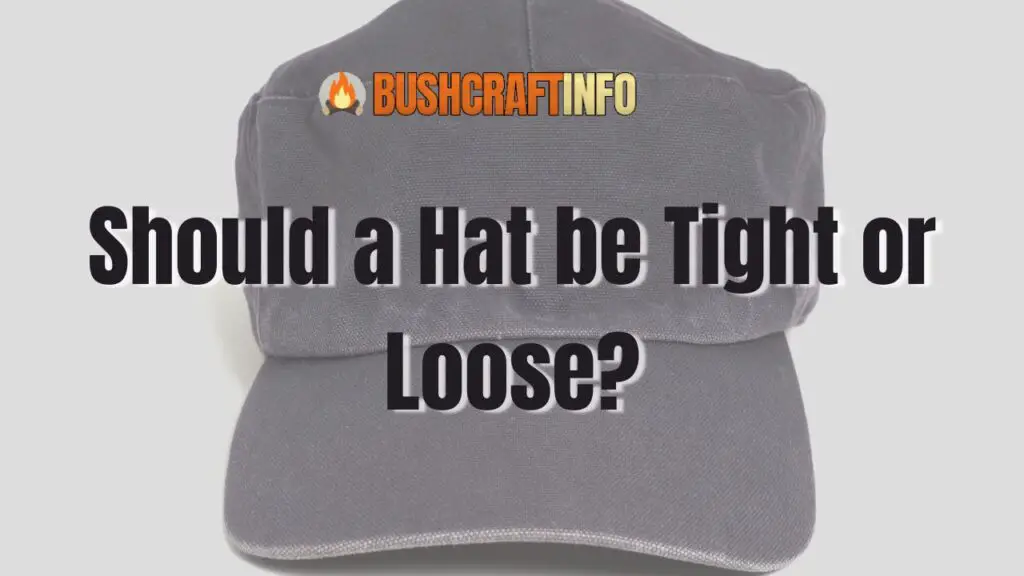One of the main things that most beginners might be struggling with is the right size of the hat. This often leads to a common question i.e. “should a hat be tight or loose?”
A hat should fit snugly rather than being too tight or loose. When in doubt about the hat’s size, try inserting two fingers between the hat and the head. When you can do so comfortably, the hat is the right size.
Are you still unclear? No worries, because I have explained everything here. Throughout this article, I will address various issues that will help you sort out all of your confusion.
So if you are interested in learning more about selecting the right size hat for yourself, then you should keep on reading!

Should a Hat Fit Loose or Snug?
When it comes to hat size, there is no one-size-fits-all answer. The right size for you depends on a number of factors, including the type of hat, the shape of your head, and your hairstyle.
For instance, if you are wearing a beanie or a baseball cap, you will want to make sure that it is tight enough to stay on your head but not so tight that it is uncomfortable.
If you are wearing a fedora or another type of hat that is meant to be worn for a more formal occasion, you will want to make sure that it fits snugly but still allows you to move your head around comfortably.
The most important thing to keep in mind when choosing the right size for your hat is that it should be comfortable. If it is too tight, it will give you a headache, and if it is too loose, it will fall off of your head.
What happens if you wear tight hats?
One of the problems that can occur from wearing tight hats is headaches. If you find that you are getting headaches after wearing a particular hat, it is likely because the hat is too small.
In addition to causing headaches, wearing a tight hat can also lead to hair loss. This is because the constant tension on the hair follicles can cause them to weaken and eventually break.
If you are experiencing hair loss, it is important to see a doctor to rule out any other underlying conditions. However, if you find that your hair loss is due to wearing tight hats, you should try switching to a larger size.
What happens if you wear loose hats?
While wearing a hat that is too loose will not cause any physical problems, it can be quite frustrating. This is because loose hats are more likely to fall off, which can be annoying, especially if you are wearing them in windy or rainy weather.
In addition to this, it can be quite annoying especially if you are in the middle of something such as riding a bike or a skateboard. Apart from that, if you are choosing a hat for bushcraft situations, then it must fit snuggly otherwise you will not be able to fully enjoy the adventure.
Do fitted hats stretch out?
Another question that often comes up is whether or not fitted hats stretch out. The answer to this question is that it depends on the type of hat and the material it is made out of.
For instance, a wool hat will stretch out more than a cotton hat. If you are looking for a hat that will not stretch out, you may want to consider one that is made out of a stiffer material, such as straw or felt.
On the other hand, if you are looking for a hat that will stretch out so that it will fit more snugly on your head, you may want to consider one that is made out of a softer material, such as cotton or wool.
The bottom line is that it all depends on what you are looking for in a hat. If you need a hat that will not stretch out, you should look for one that is made out of a stiffer material.
If you need a hat that will stretch out, you should look for one that is made out of a softer material.
What is the average size for a fitted hat?
There is no such thing as an average size for a fitted hat because everyone has a different head size. If you are looking for a hat that will fit most people, you may want to consider a hat that is adjustable, such as a snapback or a strap back.
These types of hats can be tightened or loosened to fit a variety of head sizes. If you are looking for a hat that will fit a specific person, you may want to measure their head and compare it to the size chart of the hat you are interested in.
Most companies that sell hats will have a size chart on their website or on the tag of the hat itself.
What is the best way to measure your head for a hat?
If you are looking for a hat that will fit a specific person, the best way to measure their head is to use a tape measure.
Start by measuring the circumference of their head just above their ears. Then, compare this measurement to the size chart of the hat you are interested in.
Keep in mind that most size charts list the measurements in inches. If you do not have a tape measure, you can also use a string or a piece of ribbon.
Once you have measured their head, wrap the string or ribbon around their head and mark where it meets. Then, measure the length of the string or ribbon to get the circumference of their head.
What is the difference between a fitted hat and a snapback?
A fitted hat is a type of hat that is meant to be worn snugly on your head. It usually has a brim and is made out of a stiffer material, such as wool or felt.
A snapback is a type of hat that has an adjustable strap on the back. It can be tightened or loosened to fit a variety of head sizes. Snapbacks are usually made out of a softer material, such as cotton or wool.
Both fitted hats and snapbacks are meant to be worn for a more formal occasion. The main difference between the two is that a snapback is adjustable, while a fitted hat is not.
Why do hats shrink?
Hats shrink because of the material they are made out of. Wool hats, for instance, will shrink more than cotton hats. If you are looking for a hat that will not shrink, you may want to consider one that is made out of a stiffer material, such as straw or felt.
On the other hand, if you are looking for a hat that will shrink so that it will fit more snugly on your head, you may want to consider one that is made out of a softer material, such as cotton or wool.
The bottom line is that it all depends on what you are looking for in a hat. If you need a hat that will not shrink, you should look for one that is made out of a stiffer material.
How do you stretch a hat that’s too small?
If you have a hat that is too small, you may be able to stretch it out so that it will fit more snugly on your head. The best way to do this is to wet the hat with warm water and then wear it while it is still damp.
The hat will stretch as it dries on your head. You can also try using a hat stretcher or a hairdryer to stretch out the hat.
If you are looking for a more permanent solution, you may want to consider getting the hat altered by a tailor. They will be able to add material to the inside of the hat so that it stretches and fits more snugly on your head.
Last Minute Thoughts
In the above article, I tried to answer one of the most common questions i.e. Should a Hat be Tight or Loose?
When it comes to choosing the right size for your hat, the most important thing to keep in mind is that it should be comfortable. If it is too tight, it will give you a headache, and if it is too loose, it will fall off of your head.
If you are unsure of what size to get, you may want to consider a hat that is adjustable, such as a snapback or a strap back. These types of hats can be tightened or loosened to fit a variety of head sizes.
You should also keep in mind the material the hat is made out of. A wool hat will stretch out more than a cotton hat. If you need a hat that will not stretch out, you may want to look for one that is made out of a stiffer material.
Was this post helpful?

Hey I’m Josh! I have been practicing Bushcraft for a little over 6 years now! I Started this website to review awesome bushcraft gear that I love as well as share information I have learned along the way!


